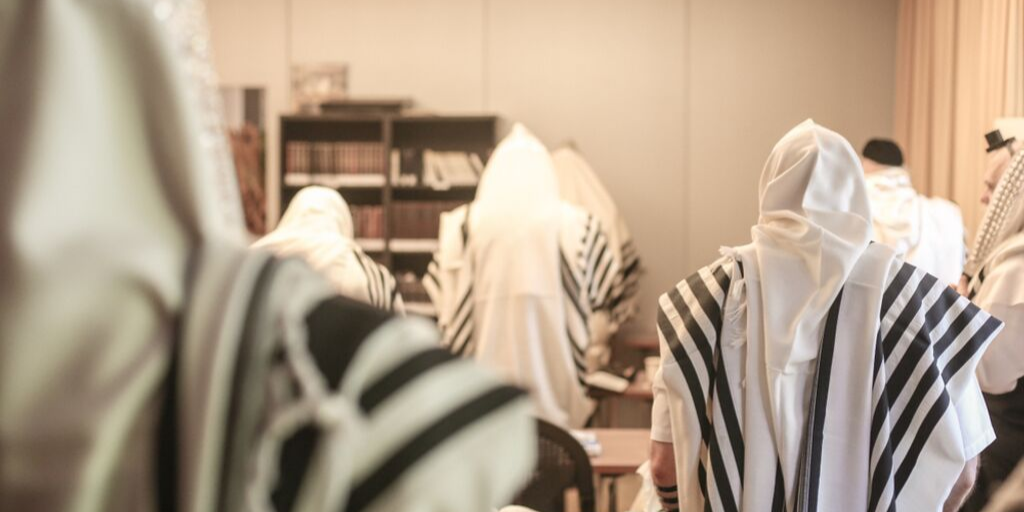We live in a material world. Each of us is undoubtedly occupied with a myriad of tasks and responsibilities that we must attend to. Whether our workplace requires our skills, a loved one needs a listening ear, or we simply need to brush our teeth, as much as we may wish to devote a substantial amount of time to spiritual opportunities, we are invariably handcuffed by the daily grind.
However, one day a year is so exalted and holy that we push off our involvement in everything non-spiritual. On Yom Kippur, like angels, we dress in white and focus solely on matters of higher purpose. The laws of the day prohibit eating, drinking, anointing the body with oils, wearing leather shoes or having marital relations; these keep us occupied with the soul rather than the body. In this optimal setting, we are free to elevate our minds above all else and mediate only on our relationship with God.
Interestingly, the day before Yom Kippur seems to conflict with the ideal setting we seek to create. The Torah states, “You shall afflict your souls on the ninth day of the month” (Leviticus 23:32). The Talmud asks, “But don’t we fast on the tenth day of the month and not on the ninth? This is to teach that whoever eats and drinks on the ninth of the month, Scripture considers it as if he fasted on both the ninth and the tenth” (Yoma 81b). According to our Sages, it’s a great mitzvah to eat the day before, and the custom is to begin Yom Kippur after completing a festive meal. Doesn’t this seem anti-climactic? After all, we are ready to hear the celestial melody of Kol Nidrei, but first, pass the chicken soup!
Picture a little baby. You put your hand in your pocket and pull out a shiny red lollipop. As your wave the candy in front of the baby, the baby’s eyes open wide with excitement and follow the lollipop’s every movement. You bring the lollipop within reach of the baby and, just as he’s about to grab it, you quickly swing your hand away from him. Each time you repeat this tease, the baby will become more focused on wanting the sweet.
 Rebbe Nachman explains that this is why God places so many obstacles in our path, to increase our desire for the goal. When we run up against difficulties in our spiritual pursuits, yet track on despite the setbacks, we desire our objective even more. But there is also a deeper reason. If God were to bless us with whatever we want before we have to struggle to achieve it, we would be overwhelmed by His blessing and not know how to hold on to it or what to do with it. But when we aren’t rewarded until we’ve been properly challenged, we appreciate and can properly utilize what we’ve now been granted.
Rebbe Nachman explains that this is why God places so many obstacles in our path, to increase our desire for the goal. When we run up against difficulties in our spiritual pursuits, yet track on despite the setbacks, we desire our objective even more. But there is also a deeper reason. If God were to bless us with whatever we want before we have to struggle to achieve it, we would be overwhelmed by His blessing and not know how to hold on to it or what to do with it. But when we aren’t rewarded until we’ve been properly challenged, we appreciate and can properly utilize what we’ve now been granted.
On Yom Kippur, we are given a tremendous opportunity: the chance to nullify our physical selves and attain a tremendous spiritual unity with God. To retain this awareness beyond the few hours of this holiest day, we must strengthen our longing and desire for this closeness. Therefore we feast before Yom Kippur. Our eating is considered like fasting because without first eating, the negation of our physical bodies will have no prolonged effect. And partaking in the festive meals, we’re forced to wait before we can negate our physicality to reach those spiritual heights. Our challenges are holy prerequisites to help us value and achieve our spiritual goals.
Then, at the climax of a whole day of fasting, we scream, “Shema Yisrael, HaShem Elokeinu, HaShem Echad!” God is our God, God is One. Standing unified with God, we realize that just as we’ve done today, so too, we can transform all of our setbacks and challenges into great desire for, and connection with, God. Amen!
Based on Likutey Halakhot, Rosh HaShanah 2

